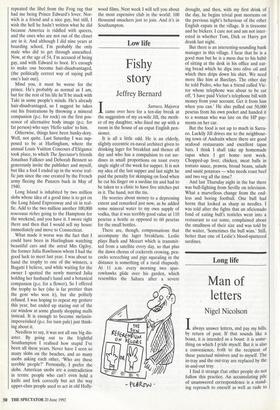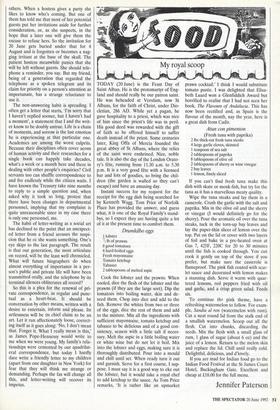Long life
Man of letters
Nigel Nicolson
Ialways answer letters, and pay my bills, by return of post. If that sounds like a boast, it is intended as a boast: it is some- thing on which I pride myself. But it is also a convenience, both to the recipient of these punctual missives and to myself. The in-tray and the out-tray are replaced by the in-and-out tray.
I find it strange that other people do not follow this practice. An accumulating pile of unanswered correspondence is a stand- ing reproach to oneself as well as rude to others. When a hostess gives a party she likes to know who's coming. But one of them has told me that most of her potential guests put her invitations aside for further consideration, or, as she suspects, in the hope that a later one will give them the excuse to refuse hers. So the invitation for 20 June gets buried under that for 4 August and is forgotten or becomes a nag- ging irritant at the base of the skull. The patient hostess meanwhile panics that she will be left without guests. She should tele- phone a reminder, you say. But my friend, being of a generation that regarded the telephone as a spoken telegram and its claim for priority on a person's attention as importunate, has a strange reluctance to use it.
The non-answering habit is spreading. I often get a letter that starts, 'I'm sorry that I haven't replied sooner, but I haven't had a moment', a statement that I and the writ- er know to be doubly untrue. Life is a chain of moments, and sorrow is the last emotion he is experiencing at that particular one.
Academics are among the worst culprits. Because their disciplines often cover aeons of human activity and their researches for a single book can happily take decades, what's a week or a month here and there in dealing with other people's enquiries? Civil servants too can shuffle correspondence to and fro endlessly while the citizen waits. I have known the Treasury take nine months to reply to a simple question and, when asked why it took so long, protest that there have been changes in departmental personnel, implying that my complaint is quite unreasonable since in my case there is only one personnel, me.
The habit of letter-writing as a social art has declined to the point that an unexpect- ed letter from a friend arouses the suspi- cion that he or she wants something. One's eye skips to the last paragraph. The result is that our generation, the most articulate on record, will be the least well chronicled. What will future biographers do when almost everything of importance in a per- son's public and private life will have been transmitted orally, and the telephone by its terminal silences obliterates all record?
So this is a plea for the renewal of pri- vate correspondence, as regular and punc- tual as a heart-beat. It should be conversation by other means, written with a desire to entertain, inform and please. Its artlessness will be its chief claim to be an art. Let it run affectionately loose, correct- ing itself as it goes along: 'No, I don't mean that. Forget it. What I really mean is this,' as James Pope-Hennessy would write to me when we were young. My family's rela- tionships were cemented by our quadrilat- eral correspondence, but today I hardly dare write a friendly letter to my children (apart from one daughter in New York) for fear that they will think me strange or demanding. Perhaps the fax will change all this, and letter-writing will recover its impetus.



























































 Previous page
Previous page